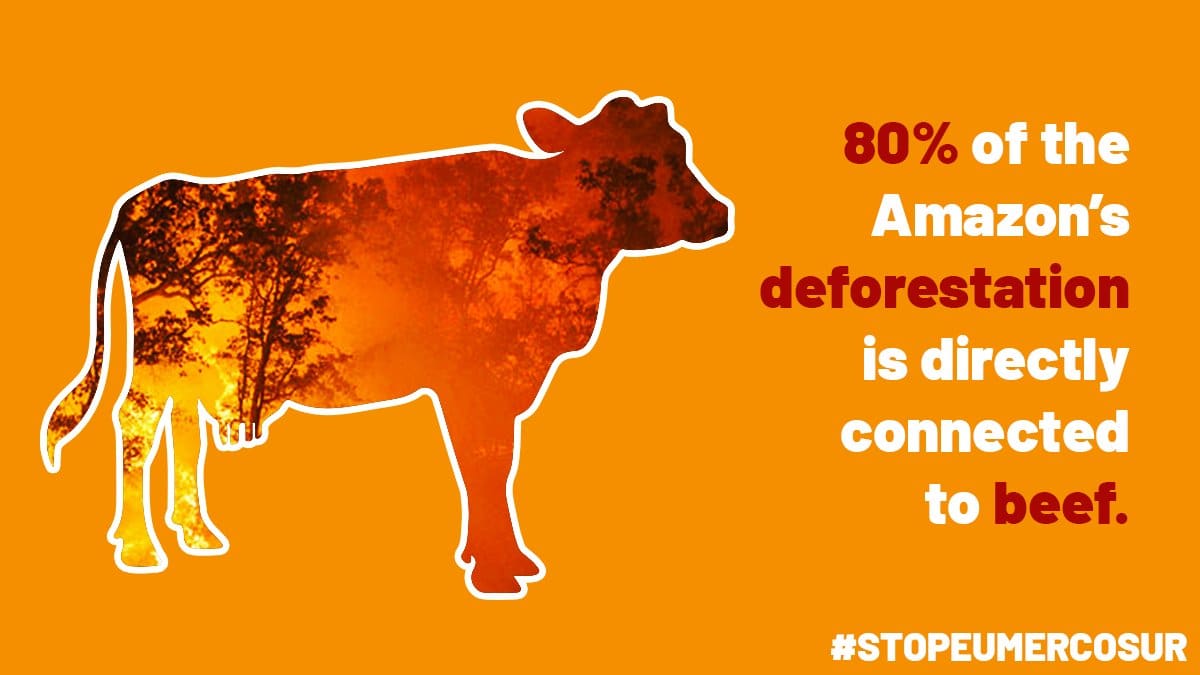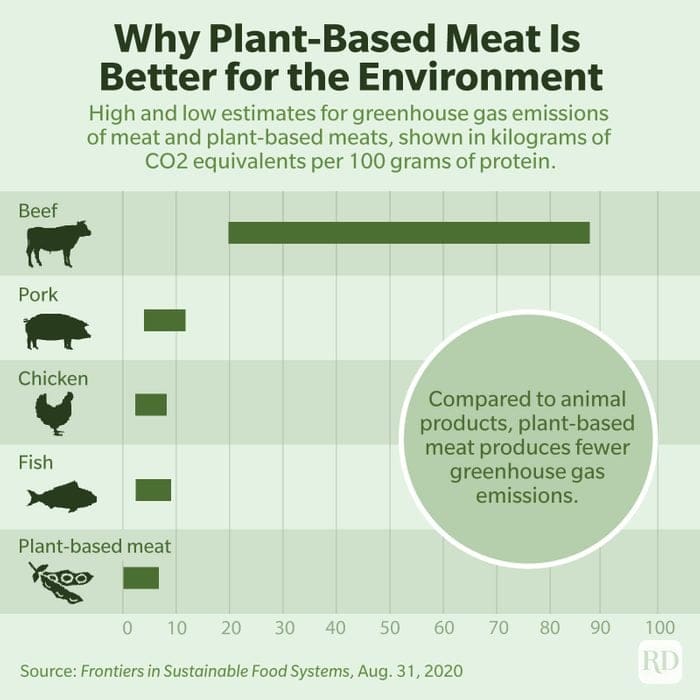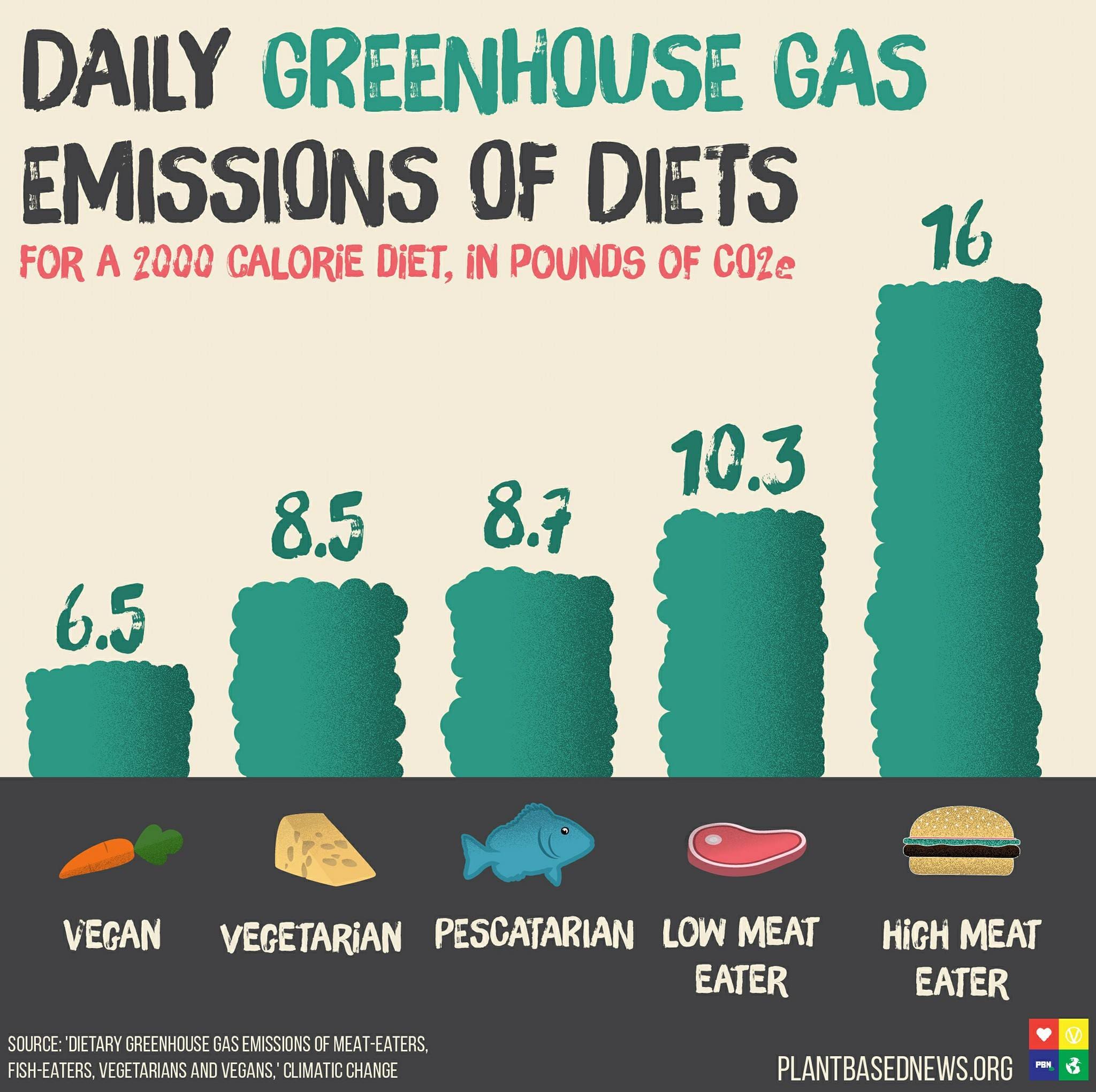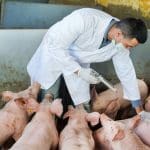A mudança climática é uma das questões mais prementes de nosso tempo, e seus efeitos estão sendo sentidos em todo o mundo. Embora muitos fatores contribuam para essa crise, uma que geralmente é esquecida é o impacto do consumo de carne. À medida que a população mundial continua a crescer e, com ela, a demanda por produtos de origem animal, a produção e o consumo de carne atingiram níveis sem precedentes. No entanto, o que muitos não percebem é que a produção de carne tem um impacto significativo em nosso ambiente e contribui para a exacerbação das mudanças climáticas. No artigo a seguir, nos aprofundaremos na ligação entre o consumo de carne e a mudança climática e exploraremos as várias maneiras pelas quais nossas escolhas alimentares estão afetando o planeta. Desde as emissões produzidas pela indústria de carne até a destruição de habitats naturais para a agricultura animal, descobriremos o verdadeiro custo de nosso apetite insaciável por carne. É crucial entender as consequências de nossas ações e tomar decisões informadas para combater os efeitos prejudiciais do consumo de carne em nosso planeta. Vamos embarcar nessa exploração juntos e lançar luz sobre a conexão muitas vezes esquecida entre o consumo de carne e as mudanças climáticas.

Impacto do consumo de carne no clima
As repercussões ambientais do consumo de carne estão se tornando cada vez mais aparentes, levantando preocupações sobre a sustentabilidade de nossos hábitos alimentares atuais. A agricultura de gado, particularmente a produção de carne bovina e cordeiro, contribui significativamente para as emissões de gases de efeito estufa, desmatamento e poluição da água. O processo de produção envolve a depuração da terra para pastoreio e crescente ração animal, o que leva ao desmatamento e perda de habitat. Além disso, o gado libera quantidades substanciais de metano, um potente gás de efeito estufa que contribui para o aquecimento global. O uso intensivo dos recursos hídricos e a descarga de resíduos de animais exacerbam ainda mais o impacto ambiental. À medida que a demanda global por carne continua a subir, é crucial reconhecer e abordar as profundas implicações de nossas escolhas alimentares nas mudanças climáticas.
Desmatamento e emissões de metano aumentam
Os crescentes níveis de desmatamento e emissões de metano apresentam desafios alarmantes no contexto das mudanças climáticas. O desmatamento, impulsionado em parte pela expansão da agricultura de gado, contribui significativamente para a liberação de gases de efeito estufa e a perda de ecossistemas vitais. A limpeza da terra para o pastoreio de gado e o cultivo de alimentos para animais não apenas destrói as florestas, mas também interrompe o delicado equilíbrio de armazenamento de carbono que esses ecossistemas fornecem. Além disso, as emissões de metano do gado, particularmente de animais ruminantes, como o gado, contribuem ainda mais para o efeito estufa. À medida que o desmatamento e as emissões de metano continuam aumentando, é imperativo que a sociedade toma ações concertadas para abordar essas questões ambientais prementes e explorar alternativas sustentáveis para mitigar o impacto do consumo de carne no planeta.

Contribuição da produção de gado para o desmatamento
A expansão da produção de gado emergiu como um fator significativo de desmatamento, exacerbando a questão já crítica das mudanças climáticas. À medida que a demanda global por carne continua a subir, vastas áreas das florestas são liberadas para dar lugar a pastagens e o cultivo de culturas de alimentos para animais. Esse processo não apenas leva à perda de ecossistemas florestais preciosos, mas também interrompe o intrincado equilíbrio de carbono que essas florestas mantêm. A escala de desmatamento causada pela agricultura de gado é impressionante, resultando na liberação de quantidades substanciais de dióxido de carbono na atmosfera. É crucial que reconheçamos o impacto prejudicial da produção de gado no desmatamento e trabalhemos para implementar práticas sustentáveis que promovem a conservação ambiental e uma abordagem responsável ao consumo de carne.
Reduzindo a pegada de carbono do consumo de carne
À medida que continuamos a explorar a ligação entre o consumo de carne e as mudanças climáticas, fica evidente que reduzir nosso consumo de carne é um passo vital para reduzir nossa pegada de carbono. O setor de gado é um contribuinte significativo para as emissões de gases de efeito estufa, representando uma parcela substancial das emissões globais. A produção de carne, particularmente a carne bovina, requer quantidades significativas de terras, água e recursos de alimentação, os quais contribuem para o desmatamento, escassez de água e aumento das emissões de gases de efeito estufa. Ao adotar uma dieta mais baseada em plantas e reduzir nossa dependência de carne, podemos reduzir significativamente as emissões de carbono associadas à produção de gado. Essa mudança não apenas beneficia o meio ambiente, mas também promove melhores resultados de saúde e apóia práticas agrícolas mais sustentáveis e éticas. Abraçar alternativas como proteínas à base de plantas e incentivar uma mudança para práticas agrícolas mais sustentáveis pode desempenhar um papel crucial na mitigação das mudanças climáticas e na criação de um futuro mais sustentável.

Alternativas baseadas em plantas ganhando popularidade
As alternativas baseadas em plantas estão ganhando popularidade significativa à medida que mais pessoas tomam conhecimento do impacto ambiental do consumo de carne. Os consumidores estão buscando ativamente opções baseadas em plantas para reduzir sua pegada ecológica e fazer escolhas mais sustentáveis. Essa demanda crescente levou a um aumento na disponibilidade e variedade de alternativas vegetais em supermercados, restaurantes e até cadeias de fast-food. Hambúrgueres, salsichas e alternativas de leite sem leite são apenas alguns exemplos de produtos inovadores que estão capturando a atenção dos consumidores. Não são apenas essas alternativas mais ecológicas, mas também oferecem uma variedade de benefícios à saúde, como serem mais baixos em gorduras saturadas e colesterol. A crescente popularidade das alternativas baseadas em plantas é um passo positivo para reduzir nossa dependência da agricultura animal e mitigar os efeitos adversos das mudanças climáticas.
O papel das escolhas individuais
As escolhas individuais desempenham um papel crucial na abordagem do vínculo entre o consumo de carne e a mudança climática. Embora a indústria agrícola e os formuladores de políticas tenham a responsabilidade de implementar práticas sustentáveis, são as decisões tomadas por indivíduos que impulsionam mudanças. Ao optar por alternativas à base de plantas e reduzir o consumo de carne, os indivíduos podem reduzir significativamente sua pegada de carbono e contribuir para mitigar as mudanças climáticas. A opção de priorizar as opções de alimentos sustentáveis não apenas beneficia o meio ambiente, mas também promove a saúde e o bem-estar pessoal. Além disso, os indivíduos podem se envolver em esforços de defesa, educar outras pessoas sobre o impacto ambiental do consumo de carne e apoiar iniciativas que promovem a agricultura sustentável. Por meio de escolhas individuais coletivas, temos o poder de criar um futuro mais sustentável e resiliente para o nosso planeta.
Remodelando nossas dietas para sustentabilidade
É imperativo que os esforços avançados no abordamento da ligação entre o consumo de carne e as mudanças climáticas, é imperativa reformular nossas dietas para a sustentabilidade. Isso implica uma mudança para uma dieta mais baseada em vegetais, com foco em consumir alimentos de origem local, sazonal e orgânica. Ao incorporar uma ampla variedade de frutas, vegetais, grãos integrais, legumes e proteínas à base de plantas em nossas refeições, não apenas reduzimos nosso impacto ambiental, mas também promovemos uma melhor saúde e nutrição. A adoção de hábitos alimentares sustentáveis também envolve minimizar o desperdício de alimentos, apoiar práticas agrícolas sustentáveis e considerar as implicações sociais e éticas de nossas escolhas alimentares. Ao abraçar essa abordagem holística para reformular nossas dietas, podemos contribuir para a criação de um sistema alimentar mais sustentável e resiliente, beneficiando o planeta e as gerações futuras.
Em conclusão, a evidência é clara de que a produção e o consumo de carne contribuem significativamente para as mudanças climáticas. Como indivíduos, temos o poder de fazer a diferença, reduzindo nosso consumo de carne e escolhendo opções mais sustentáveis e baseadas em plantas. Também é importante que governos e corporações tomem medidas e implementem políticas e práticas que promovam sistemas alimentares mais sustentáveis. Ao trabalhar juntos, podemos causar um impacto positivo no meio ambiente e ajudar a combater os efeitos das mudanças climáticas. Todos nós façamos nossa parte para criar um futuro mais saudável e sustentável para nós mesmos e gerações vindouras.

Perguntas frequentes
Qual é a relação entre consumo de carne e emissões de gases de efeito estufa?
O consumo de carne é um contribuinte significativo para as emissões de gases de efeito estufa. A produção de carne, especialmente carne bovina e cordeiro, requer grandes quantidades de terra, água e alimentação, resultando em desmatamento, poluição da água e aumento das emissões de metano, um potente gás de efeito estufa. Segundo as Nações Unidas, a indústria de gado é responsável por cerca de 14,5% das emissões globais de gases de efeito estufa. Portanto, reduzir o consumo de carne e optar por mais dietas à base de plantas pode desempenhar um papel crucial na mitigação das mudanças climáticas.
Como a produção de carne contribui para o desmatamento e a destruição do habitat?
A produção de carne contribui para o desmatamento e a destruição do habitat principalmente através da expansão das áreas de pastoreio de gado e do cultivo de culturas de alimentação. Grandes áreas das florestas são limpas para criar pastagens para gado, resultando na perda de biodiversidade e interrupção nos ecossistemas. Além disso, vastas quantidades de terra são usadas para cultivar culturas como soja e milho para alimentar o gado, impulsionando ainda mais o desmatamento. Esse processo não apenas contribui para a destruição do habitat, mas também libera dióxido de carbono na atmosfera, exacerbando as mudanças climáticas.
Quais são as principais maneiras pelas quais a produção de carne contribui para a poluição da água e a escassez?
A produção de carne contribui para a poluição da água e a escassez principalmente através do uso excessivo de água para irrigação de culturas de alimentos para animais, contaminação de corpos d'água com esterco e produtos químicos agrícolas e o esgotamento insustentável dos recursos hídricos. A produção de culturas de alimentação, como soja e milho, requer grandes quantidades de água, levando à escassez de água em regiões onde essas culturas são cultivadas. Além disso, o descarte de desperdício de animais e o uso de fertilizantes e pesticidas em corpos de água da agricultura animal poluem os corpos d'água, causando escoamento de nutrientes e flores nocivas de algas. Finalmente, o intensivo uso de água para água potável e saneamento contribui para a escassez geral da água, particularmente em áreas com altas concentrações de produção de gado.
Como o transporte e a distribuição de produtos à base de carne contribuem para as emissões de carbono?
O transporte e a distribuição de produtos à base de carne contribuem para as emissões de carbono de várias maneiras. Em primeiro lugar, o transporte de animais vivos para matadouros e instalações de processamento requer combustível para caminhões e outros veículos, o que libera dióxido de carbono na atmosfera. Em segundo lugar, os produtos de carne processada são transportados para centros de distribuição e, finalmente, para os locais de varejo, novamente usando combustível e emitindo dióxido de carbono. Além disso, o armazenamento e a refrigeração de produtos à carne também requerem energia, geralmente derivada de combustíveis fósseis, o que contribui ainda mais para as emissões de carbono. No geral, o transporte e a distribuição de produtos à base de carne contribuem significativamente para as emissões de carbono na indústria de alimentos.
Existem alternativas sustentáveis ao consumo de carne que pode ajudar a mitigar as mudanças climáticas?
Sim, existem alternativas sustentáveis ao consumo de carne que podem ajudar a mitigar as mudanças climáticas. Dietas à base de plantas, como dietas vegetarianas ou veganas, têm uma pegada de carbono mais baixa em comparação com as dietas que incluem carne. Ao reduzir ou eliminar o consumo de carne, podemos diminuir as emissões de gases de efeito estufa, economizar água e reduzir o desmatamento associado à agricultura de gado. Além disso, fontes de proteínas alternativas como tofu, tempeh e substitutos de carne à base de plantas estão se tornando mais amplamente disponíveis, oferecendo opções sustentáveis para aqueles que ainda desejam o sabor e a textura da carne. A transição para essas alternativas pode desempenhar um papel significativo no combate às mudanças climáticas.















































